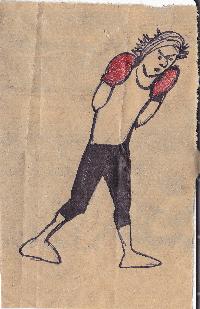| Pages in topic: < [1 2 3 4 5] > | Off topic: How do the Dutch say \'double Dutch\'? Or the Russians \'Russian Roulette\'? More... Thread poster: Libero_Lang_Lab
|
|---|
alpha&omega (X)
Local time: 16:40
| En Cuba también | May 24, 2003 |
En Cuba, cuando algo está chino, o alguien habla en chino, no se entiende...alguien tiene el pelo chino, cuando lo tiene muy lacio, o es chinito, cuando tiene ojos razgados...tenemos la llave inglesa, una herramienta...no se trabaja pa'l inglés (trabajar de gratis)...un besito ruso o de piquito es cuando los labios se tocan solamente rapido...un beso francés es largo, apasionado y con intercambio de fluídos...
Juan Jacob wrote:
...acá, en México, está en chino: incomprensible. Pero, por otro lado, una persona que tenga el pelo chino es aquella que lo tiene completamente lacio. Y una "china" poblana es una habitante del Estado de Puebla, ataviada con traje típico.
En cuanto a nacionalidades y sexo, hacer un "francés" quiere decir: tailler une pipe !
(D'ailleurs, la vitesse maximum pour faire l'amour, c'est 68... parce qu'à 69, on se retourne !)
Bon, courage...
Juan Jacob.
| | | | alpha&omega (X)
Local time: 16:40
| There's some more over here... | May 24, 2003 |
In Cuba they say: Hacerse el sueco (to pretend to be Swedish) when someone is acting like he/she doesn\'t understand anything of what\'s going on.
Me está hablando en chino (He/she is talking to me in Chinese) when you don\'t understand what they say.
Tiene el pelo chino (Has Chinese hair) when the person has super sleek and stright hair.
Es chino, o tiene los ojos achinados (Is Chinese or has Chinese eyes) when the person has Asian eyes.
Lla... See more In Cuba they say: Hacerse el sueco (to pretend to be Swedish) when someone is acting like he/she doesn\'t understand anything of what\'s going on.
Me está hablando en chino (He/she is talking to me in Chinese) when you don\'t understand what they say.
Tiene el pelo chino (Has Chinese hair) when the person has super sleek and stright hair.
Es chino, o tiene los ojos achinados (Is Chinese or has Chinese eyes) when the person has Asian eyes.
Llave inglesa (English key)is a piece of tool.
Un besito ruso (a little Russian kiss) is that one when lips barely touch real fast.
Un beso francés (a French kiss) is the one when lips are opened and tongues and fluids are exchanged in a long passionate lustul kiss...
Trabajar pa\'l inglés...(to work for the English) means to work hard with no remuneration
Baño turco...(Turkish bath) is something like a sauna
Camellos...(camels) are the public means of transportation, a turck pulls a long, massive trailer that has three levels and gives it the shape of the two slopes on the camels...Now, being inside the camel is like being in a \"Película del Sábado\" (Saturday night movie) where you can find violence, sex and adult language.
I am sure there\'s a lot more but I will have to think about them...
Have a great day!! ▲ Collapse
| | | | izy 
Local time: 22:40
English to German
+ ...
| Das kommt mir Spanisch vor! | Jun 11, 2003 |
You say in German if there's something you don't understand, and I also wonder if the average French knows what a Spanish 'tortilla francesa' is!
Just to add something else
| | | | Özden Arıkan 
Germany
Local time: 23:40
Member
English to Turkish
+ ...
Amy Taylor wrote:
In Italian, the expression used to denote someone who enters without paying the admission ticket is "fare il portoghese".
And while we're at it, how do the Turkish describe someone who smokes a great deal?
In reference to Dan's post about Congress and Liberty fries, check out Mark Fiore's cartoon on the subject. Hysterical.
a turkey is "hindi", mainly because the bird is native to the land of the Indians, America that is. And we call oranges "portakal" because the first oranges in Turkey reportedly came from Portugal. And when we say "I am all French to it" we mean exactly "It's all Greek to me". Just as "turkey" is both the name of a country and of a bird in English, "mýsýr" is both the name of a country, Egypt, and of a plant, corn, in Turkish. But I don't wonder what Egyptians call their country, because our word for it comes from its original name, Misr. So unlike "hindi" and "portakal", the similarity here (to "corn") must be mere coincidence.
And to answer your question, Amy, a heavy smoker is called "a chimney" in Turkish. So we are only second to chimneys, it seems, in our smoking habits.
| | |
|
|
|
PB Trans
Local time: 22:40
French to English
+ ...
| Canadian bacon | Nov 2, 2003 |
It's just peameal bacon. I guess calling it "Canadian Bacon" makes it sound more appetizing??
| | | | Jack Doughty 
United Kingdom
Local time: 22:40
Russian to English
+ ...
In memoriam
Our French master at school, appalled by our bad pronunciation, used to say: "Vous parlez français comme une vache espagnole!" Could you say in Spanish "Hablas español como una vaca francesa"?
[Edited at 2003-11-02 19:53]
| | | | PB Trans
Local time: 22:40
French to English
+ ...
| Speaking of turkey... | Nov 4, 2003 |
Xola wrote:
a turkey is "hindi", mainly because the bird is native to the land of the Indians, America that is. And we call oranges "portakal" because the first oranges in Turkey reportedly came from Portugal... Just as "turkey" is both the name of a country and of a bird in English, "mýsýr" is both the name of a country, Egypt, and of a plant, corn, in Turkish.
I've always found it fascinating that the Portuguese word "peru" means "turkey" and not the country "Peru". It's all so confusing when you are trying to learn the language!
By the way, I am stil laughing at NancyLynn's post about the "sandwich a la turquie"! ) )
| | | | MJ Barber 
Spain
Local time: 23:40
Spanish to English
+ ...
| For the Englishman to see | Nov 20, 2003 |
Just remembered another one. In Portugal, when you do something in a superficial manner, for show, to cause an impression of work, it is "para o inglês ver" i.e., for the Englishman to see.
I can't think of any equivalent in English or Spanish at the moment
BTW, Rachel, the only kids I ever heard sayign pisgetti for spaghetti are my sister's kids. But seeing as how she didn't teach them that, they must have got it from the kids in school (in southern England). I'd cert... See more Just remembered another one. In Portugal, when you do something in a superficial manner, for show, to cause an impression of work, it is "para o inglês ver" i.e., for the Englishman to see.
I can't think of any equivalent in English or Spanish at the moment
BTW, Rachel, the only kids I ever heard sayign pisgetti for spaghetti are my sister's kids. But seeing as how she didn't teach them that, they must have got it from the kids in school (in southern England). I'd certainly never heard it in Ireland. ▲ Collapse
| | |
|
|
|
| spanish "filete ruso" in Russian | Dec 1, 2003 |
Hello after all my years of Russian studying I must aknowledge I don't know exactly which Russian word corresponds to the spanish "filete ruso". I think the are not "ðóññêèé áèôøòåêñ" after all my years of Russian studying I must aknowledge I don't know exactly which Russian word corresponds to the spanish "filete ruso". I think the are not "ðóññêèé áèôøòåêñ" )) ))
The look very similar to the american hamburguers.
And how about "Montaña rusa"? I remember a posting about this. I just don´t remem... See more
| | | | | Spring in the air | Dec 11, 2003 |
It was springtime 1946 and a Jewish displaced person was wearily making his way in New York, after a long and painful journey. An offensively cheerful American stopped him and exclaimed: "Cheer up man, spring in the air". The immigrant just looked at him and said in a heavily German accent:"Spring yourself".
Regards,
N.Raghavan
| | | | Jack Doughty 
United Kingdom
Local time: 22:40
Russian to English
+ ...
In memoriam | Talking turkey | Dec 21, 2003 |
The subject of why turkeys are called what they are in various languages has come up earlier in this topic.
An article by Mark Steyn in the 'Sunday Telegraph' today has this to say on the subject:
The bird was introduced to Europe early in the 16th century by one of Sebastian Cabot's men who brought it from the New World. The turkey came from Mexico, but was generally assumed to be "a bird of India" (French dinde) everywhere except Britain, where it was named af... See more The subject of why turkeys are called what they are in various languages has come up earlier in this topic.
An article by Mark Steyn in the 'Sunday Telegraph' today has this to say on the subject:
The bird was introduced to Europe early in the 16th century by one of Sebastian Cabot's men who brought it from the New World. The turkey came from Mexico, but was generally assumed to be "a bird of India" (French dinde) everywhere except Britain, where it was named after Turkey because it was similar to a pre-existing bird introduced from Turkey but actually from Guinea, and subsequently re-named the guinea fowl, which was thought to be less confusing than renaming the new turkey the mexico, though in America there is a sub-species of turkey called the mexicana.
[Edited at 2003-12-21 16:38] ▲ Collapse
| | | | NancyLynn
Canada
Local time: 17:40
Member (2002)
French to English
+ ...
Moderator of this forum | Canadian bacon | Dec 21, 2003 |
is known as "back bacon", except in really touristy areas such as Niagara Falls, where it is Canadian bacon. Then again, I noticed when I was there a few days ago all the prices on the menus were in American dollars, with Canadian prices (higher of course) in smaller font below. all the prices on the menus were in American dollars, with Canadian prices (higher of course) in smaller font below.
I remember in England we could choose from gammon or streaky bacon, what we call here back and side bacon.
Whichever you choose, be sure it's ... See more is known as "back bacon", except in really touristy areas such as Niagara Falls, where it is Canadian bacon. Then again, I noticed when I was there a few days ago all the prices on the menus were in American dollars, with Canadian prices (higher of course) in smaller font below. all the prices on the menus were in American dollars, with Canadian prices (higher of course) in smaller font below.
I remember in England we could choose from gammon or streaky bacon, what we call here back and side bacon.
Whichever you choose, be sure it's maple smoked, a Canadian specialty.
As for filer a l'anglaise : in my bartending days we had a different expression, D&D, no, not Dungeons & Dragons , but rather Dine and Dash - eat and leave without paying, which by the way usually comes out of the waiter's wages. , but rather Dine and Dash - eat and leave without paying, which by the way usually comes out of the waiter's wages.
Which leads us to two more expressions : there are no victimless crimes, and there is no free lunch.:-)
Bonne journée à tous et à toutes,
N. ▲ Collapse
| | |
|
|
|
Annet Fransen 
Netherlands
Local time: 23:40
Dutch to English
+ ...
And we call "chiave inglese" a spanner (I don't know why).[/quote]
The Dutch translation of 'spanner' is 'Engelse sleutel', so that's along the same lines as 'chiave inglese' in Italian. I don't know why that's the case either.
| | | | Annet Fransen 
Netherlands
Local time: 23:40
Dutch to English
+ ...
Rachel Vanarsdall wrote:
What are the Dutch equivalents of:
Dutch courage, Dutch uncles, Dutch treat
are these expressions used in England as well or are they American (from knickerbocker days?)
and what about Dutch doors and Dutch ovens?
And do the Dutch really like sauce hollandaise?
Do they "dutch" their cocoa?
and what about the Spanish, what's their equivalent for building "chateaux en Espagne?"
I don't think this Dutch thing has been answered yet, so allow me to try:
The Dutch equivalents of 'dutch treat, courage etc.' do not include the word 'Dutch'. I'm pretty sure a lot of Dutch folks would be not so pleasantly surprised if they were to find out how the word Dutch is used in the UK and US
| | | | | Never heard about it before... | Jan 14, 2004 |
Bence Ági wrote:
When I was in Russia, I was told never to say "Ja vengerka" (I am Hungarian, or I am a Hungarian woman) because this word means something like "prostitute". They say that the tsars had brought Hungarian women for this purpose...
I'm native Russian, and I never heard this word has such sense. As to "bolgarka" (Bulgarian woman) - it's circular cutting tool, in Russian slang
| | | | | Pages in topic: < [1 2 3 4 5] > | To report site rules violations or get help, contact a site moderator: You can also contact site staff by submitting a support request » How do the Dutch say \'double Dutch\'? Or the Russians \'Russian Roulette\'? More... | Trados Business Manager Lite | Create customer quotes and invoices from within Trados Studio
Trados Business Manager Lite helps to simplify and speed up some of the daily tasks, such as invoicing and reporting, associated with running your freelance translation business.
More info » |
| | Protemos translation business management system | Create your account in minutes, and start working! 3-month trial for agencies, and free for freelancers!
The system lets you keep client/vendor database, with contacts and rates, manage projects and assign jobs to vendors, issue invoices, track payments, store and manage project files, generate business reports on turnover profit per client/manager etc.
More info » |
|
| | | | X Sign in to your ProZ.com account... | | | | | |













